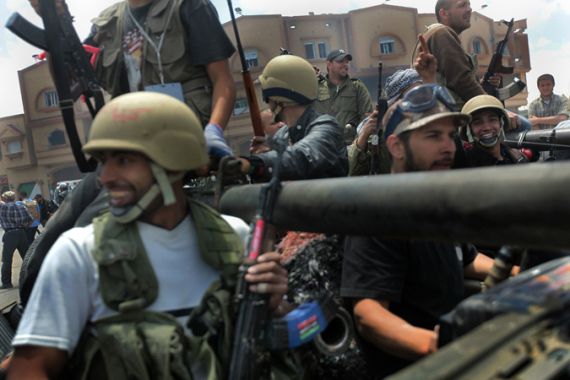Libyan rebels seek US recognition
Libyan rebels’ foreign minister set to request financial assistance during talks with US officials in Washington.

 |
| The US is keen on a support role but appears unready to grant full status to Libya’s NTC [Getty/AFP] |
Mahmoud Jibril, a Libyan rebel leader, is in Washington for a meeting with the US national security adviser, a day after the British government invited the Libyan rebel council to open its first foreign office in London.
Jibril, who serves as the foreign minister of the rebels’ National Transitional Council (NTC), was to hold White House talks with Tom Donilon, the US national security adviser to Barack Obama, the US president, on Friday.
The rebels have made a plea for Washington to free up some $180 million in frozen Gaddafi assets to fund their campaign.
Nicolas Sarkozy, the French president, will meet Jibril in Paris on Saturday to discuss the conflict and prospects for transition, his office said.
The meeting comes ahead of a Russian call for negotiations between Libyan rebels and Muammar Gaddafi’s government as soon as possible.
The statement, released on Friday, emphasised Moscow’s opposition to any foreign interference in Libya, Syria or other states in the region.
In wide-ranging remarks in Kazakhstan, Sergei Lavrov, the Russian foreign minister, also said Iran must engage in “serious conversation” with global powers to dispel concerns it could be seeking nuclear weapons, Russian news agencies reported.
He suggested a resolution of the conflict would usher in a new government, but that talks with Gaddafi’s government were unavoidable.
The result of dialogue “will be a new political system, but it is necessary to seek agreement also with those upon whom the prospects for calming the situation depends”, Lavrov said.
Russia says a Western-led coalition conducting air strikes in Libya is overstepping its UN Security Council mandate to protect civilians, and has vocally opposed foreign intervention in other conflicts in the Middle East and North Africa.
US hesitant
US officials would not say whether Obama would drop by Jibril’s meeting with Donilon, a practice sometimes used by the White House for guests for whom protocol does not dictate an official meeting.
Asked what he expected from Friday’s talks with the US administration, Jibril replied: “We need the recognition.”
 |
The Libyan opposition, based in the eastern city of Benghazi, wants the United States to recognise the body as “the sole legitimate interlocutor of the Libyan people”, he said.
Unlike France, Italy, Gambia and Qatar, the United States has not yet formally recognised the NTC.
Jibril told reporters he believed Jordan would join the ranks of those who recognise the opposition in the coming days.
“All we need is for the world to understand our cause and help us get our legitimate rights realised,” he said.
Jay Carney, the White House spokesman, however, has signalled that Washington, which helped launch the NATO military operation and has since taken a support role, is not ready to grant full status to the NTC.
Jibril said earlier that the council was facing a “very acute financial problem” and needed help from the US administration.
Last week, Hillary Clinton, the US secretary of state, said the Gaddafi regime’s frozen assets in the US would be used to help “the Libyan people”.
Frozen assets
About $30bn dollars in Libyan assets have been frozen in the US as a result of economic sanctions.
Jibril’s visit comes as the Obama administration gradually steps up contacts with Gaddafi’s opposition to better understand the movement before deciding on the extent of US assistance.
Robert Gates, the US defence secretary, has said the air war in Libya cost the US roughly $750m to date, more than the Pentagon’s initial estimate of $604m.
On Thursday, another senior rebel leader, Mustafa Abdul Jalil, met David Cameron, the British prime minister, who invited the NTC to open an office in London, its first foreign mission.
In Libya, Salah Badi, who commanded the rebel assault on Misurata’s airport, said rebel positions were now only 10km from Zliten, the next main centre on the 215km coastal road from Misurata to Tripoli.
Canadian and British warships patrolling waters off Libya beat back an attack by an unspecified number of fast-moving small boats on the Misurata port hours after the city’s airport fell to rebels, NATO said in a statement.
The Canadian frigate HMCS Charlottetown and British destroyer HMS Liverpool joined a French gunboat not under NATO command to turn back the pro-Gaddafi forces early on Thursday, the alliance said.
NATO ‘kills’ clerics
Meanwhile, 11 Muslim clerics were killed in their sleep by a NATO airstrike on Friday on the eastern oil town of Brega, a Libyan government spokesperson said.
Moussa Ibrahim said the clerics were among a large group of imams who had gathered in Brega to pray for peace in conflict-ridden Libya. He said 11 imams were killed and 50 people wounded, including five in critical condition.
 |
NATO, responding to the Libyan claim, said it had attacked a command-and-control centre used by Gaddafi’s forces in Brega.
“We’re very careful in the selection of our targets and this one was very clearly identified as a command centre,” said an official at NATO’s operational headquarters in Naples, Italy, who under the alliance’s rules could not be named.
NATO has been intensifying airstrikes in many parts of Libya against troops and installations of Gaddafi’s regime in a bid to weaken his campaign against a rebel uprising.
“NATO proves that it doesn’t have a moral centre,” Ibrahim said. “Now they are moving to kill imams, religious leaders who are calling for peace.”
Foreigner killed
The attack came as rebels celebrated the breaking of the two-month siege of the city.
Separately, a French private security contractor was shot dead and four others arrested in an incident at a checkpoint in Benghazi, officials said.
Pierre Marziali was the president and founder of SECOPEX Conseil, a private military company. The 48-year-old died hours before a meeting scheduled with Libya’s transitional government, SECOPEX confirmed on Friday.
“During a police check in Benghazi last night, five French nationals were detained,” Bernard Valero, a spokesperson French foreign ministry said.
“One of them was wounded by a bullet and died overnight in a hospital in Benghazi” while the other four remain in detention, he said, confirming a report by a doctor at the hospital.
The French government’s statement did not say who fired the bullet that killed the contractor in Benghazi, which is far from the front line in the Libyan conflict and which at the moment is a relatively safe city.